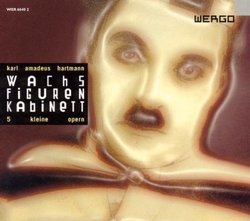| All Artists: Karl Amadeus Hartmann, Roger Epple, Deutsches Symphonie Orchester Title: Hartmann: Wachsfigurenkabinett- 5 Small Operas Members Wishing: 1 Total Copies: 0 Label: Wergo Germany Release Date: 9/11/2001 Album Type: Import Genre: Classical Style: Opera & Classical Vocal Number of Discs: 1 SwapaCD Credits: 1 UPCs: 4010228664027, 713746164225 |
Search - Karl Amadeus Hartmann, Roger Epple, Deutsches Symphonie Orchester :: Hartmann: Wachsfigurenkabinett- 5 Small Operas
 | Karl Amadeus Hartmann, Roger Epple, Deutsches Symphonie Orchester Hartmann: Wachsfigurenkabinett- 5 Small Operas Genre: Classical
Karl Amadeus Hartmann is best known for his refusal to participate in Germany's Nazi-dominated musical life, his postwar emergence as a major symphonist, and his key role as patron to trail-blazing younger modern composers... more » |
Larger Image |
CD Details
Synopsis
Amazon.com
Karl Amadeus Hartmann is best known for his refusal to participate in Germany's Nazi-dominated musical life, his postwar emergence as a major symphonist, and his key role as patron to trail-blazing younger modern composers. This valuable release adds a new perspective to his career. Wachsfigurenkabinett ("Waxworks"), the product of a decade's work, consists of five mini-operas labeled "waxworks" because, like those frozen figures, there's no character development, just a series of satirical scenes. It's all typical Weimar 1920s, a sibling to the cabaret-based music Kurt Weill was producing. Jazz, dance, and Stravinsky are other obvious influences on the young Hartmann, who translated his social concerns into ironic, instantly appealing music. The subjects are timely even today: phony spiritualism, mass media, family relations. Sometimes they're combined, as in the longest of these miniatures, the Weill sound-alike Chaplin-Ford-Trott, which takes aim at capitalism. Composers Hartmann aided, including Hans Werner Henze, have restored some of the pieces from sketches. Aside from its importance in enlarging our understanding of Hartmann, Waxworks offers a heap of listening fun. --Dan Davis

 Track Listings (5) - Disc #1
Track Listings (5) - Disc #1